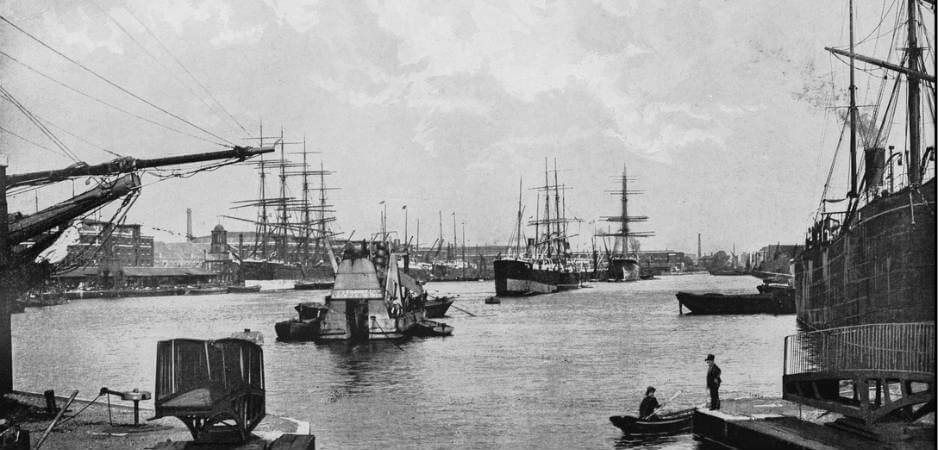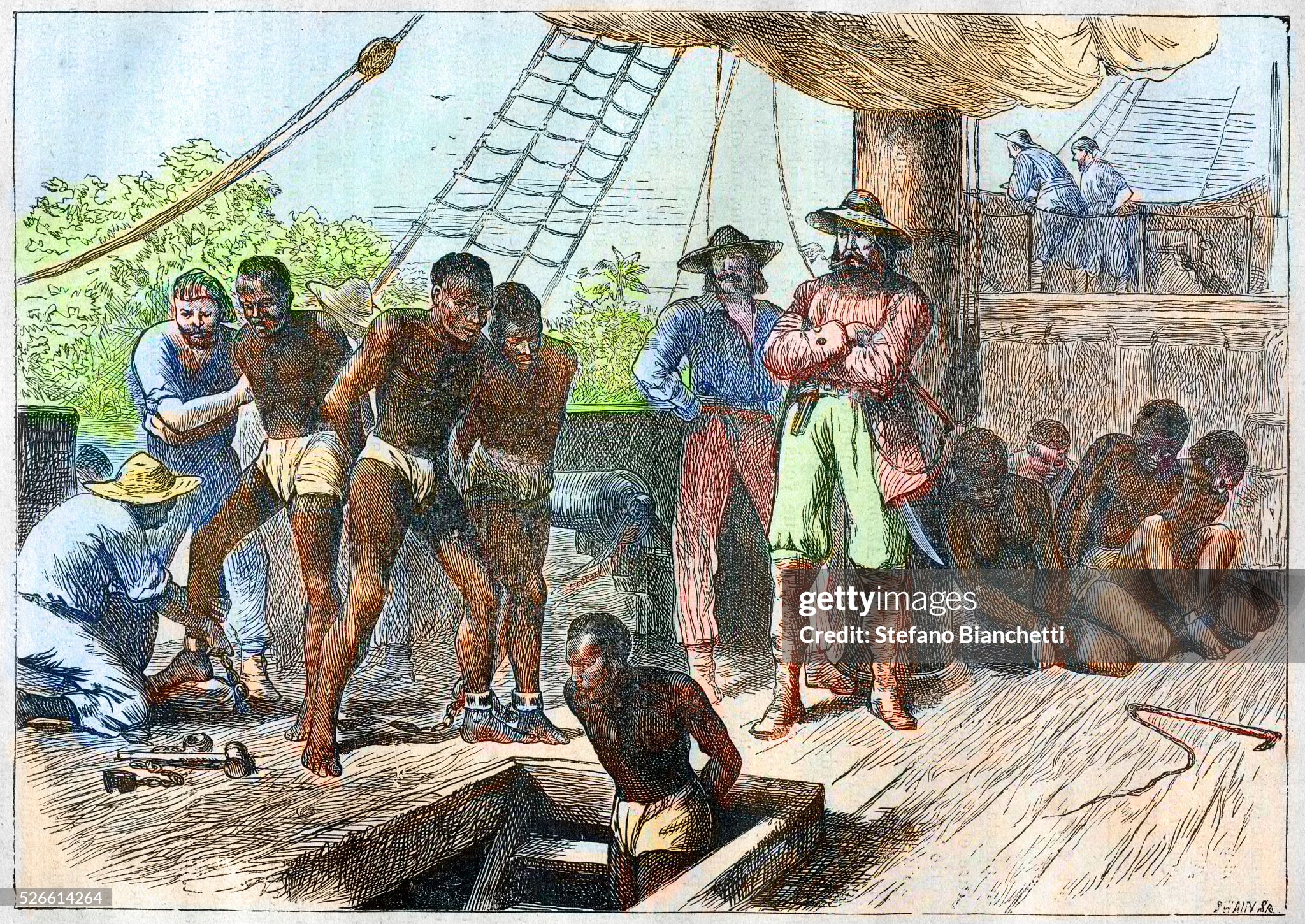Taboo: The East India Company and the True Horrors of Empire

West India Dock, London @ ilbusca
Slavery and colonial exploitation are fundamentally entwined with Britain’s modern prosperity.
“When you left London the East India Company was a trading company,” Tom Hardy’s troubled anti-hero James Delaney is warned in the second episode of the BBC’s prime-time drama Taboo. “Now it is God Almighty.” Discussing the show before it aired, writer Stephen Knight referred to the East India Company as “the equivalent of the CIA, the NSA and the biggest, baddest multinational corporation on earth, all rolled into one self-righteous, religiously motivated monolith.”
The East India Company (EIC) was certainly both economically and politically powerful in early 19th-century Britain. With large swathes of the Indian subcontinent under its control by 1818 and financial clout in London exceeded only by that of the Bank of England, the EIC didn’t get where it was by playing nicely.
“We’ve screwed Maharajas, and we’ve screwed Moghuls,” the EIC’s fictional chairman, Sir Stuart Strange, declares in episode three—something to which the numerous delegations from Indian rulers arriving in London in the first half of the 19th century could attest. These rulers believed that if they could present evidence of broken treaties, annexed lands and non-payment of obligations in the imperial capital, they would receive redress for the EIC’s bad faith.
They were wrong. The slow encroachment of the East India Company on Indian land, resources and political authority continued unabated until it was violently cut short by the Indian Uprising of 1857.
Absent India
But India is strangely absent from Taboo’s depiction of early 19th-century London. London’s multi-ethnic foreshore features Africans, Chinese, a “Malay” and even a Maori, but there is little sign of the Indian lascars (sailors) and dockworkers who would also have populated the banks of the Thames.
The EIC is positioned as an all-powerful antagonist, but the subcontinent from which it drew most of its wealth and power is alluded to only briefly, in vague references to a dispute between it and the crown over Bombay. More airtime is given to its (historically non-existent) Africa desk, while the plot centers around the trade in sea otter pelts from Vancouver to Canton and the anachronistic involvement of a company ship in the transatlantic slave trade.Embed from Getty Images

In 1804, when the slave voyage that forms a narrative cornerstone of Taboo is supposed to have taken place, the slave trade was still legal. So the ill-fated voyage of the Cornwallis is presented not as a breach of national law, but of East India Company policy.
Presumably, this is to get around the fact that the EIC was not involved in the transatlantic trade in this period. The last known voyage of an EIC slave vessel left Cabinda, in Angola, in 1765, nearly 50 years before the action in Taboo. That human cargo was headed for Bengkulu in Indonesia, not the sugar plantations of the West Indies. The EIC’s involvement in slave trafficking is a story that deserves to be told, but it was largely confined to 17th and early 18th centuries, and to the Indian, rather than the Atlantic Ocean.
Pedantry over historical accuracy is exactly why my husband won’t watch period dramas with me anymore. The use of a supposed outbreak of cholera to cover up various illicit goings on in 1814 might be jarring given that the disease did not reach Britain until 1831, but ultimately the anomaly does not detract from enjoyment of the drama.
Similarly, much of Taboo’s plot exposition regarding the nefarious activities of the East India Company goes on under the protection of the “raised hand,” which when raised in meetings excludes key revelations from the official minutes, and so from the historical archive. We do not know if this ever really happened, but is a clever device that creates space for some dramatic historical flights of fancy. As a historian of the period, I found it an evocative reminder of the silences in the historical record and the limitations on what we can glean about how the company functioned from its voluminous manuscript records.
What we know about the way the EIC operated, and how it related to Parliament, the crown and its colonies does conflict with its representation in Taboo. But, of course, in historical research there is always the potential for “unknown unknowns.”
Imperial Villains
But I do find other elements more significantly problematic. Particularly, the way in which Taboo inflates the role of the EIC as a global power, while simultaneously erasing its most significant sphere of influence and its most profound impacts.
The East India Company is presented both as more powerful than it actually was and as guilty of atrocities it was not responsible for. Meanwhile, many of the crimes it actually did commit, such as facilitating the opium trade, exacerbating rural poverty and famine, and aggressively extracting revenue in India are written out of the narrative.
Admittedly, the institutionalised exploitation of colonial resources through over-taxation and the slow drain of wealth are not particularly televisual, but they had long-lasting consequences for Indian society and economy. The silences and exaggerations in the depiction of this period of Britain’s colonial past are also important because they speak directly to how we understand the relationship between colonial exploitation and Britain’s social, economic and political development.
In a world in which jingoistic nationalism and imperial nostalgia are becoming increasingly potent forces, Taboo’s portrayal of the dark heart of colonial expansion is a timely reminder of the violent, ambivalent and amoral origins of globalization. There is no doubt that there are some very “bad hombres” in this show, including Delaney himself (whose character seems to be symbolic of both British colonial violence and imperial paranoia about supposed “native” savagery).
Yet by focusing on these Machiavellian figures as the movers and shakers of empire, Taboo allows the viewer to disassociate imperial misdeeds from mainstream British history. In doing so, it overlooks the pervasiveness of the imperial connection, its importance to the development of modern Britain and the deep structural inequalities that resulted from Britain’s global expansion.
Far from being the preserve of pantomime villains and all-powerful and unethical corporations, the impetus for—and profits from—slavery and colonial exploitation were deeply embedded in everyday life. They are therefore fundamentally entwined with our modern prosperity.
*[This article was originally published by The Conversation.] ![]()
The views expressed in this article are the author’s own and do not necessarily reflect Fair Observer’s editorial policy.
Photo Credit: ilbusca


No comments:
Post a Comment